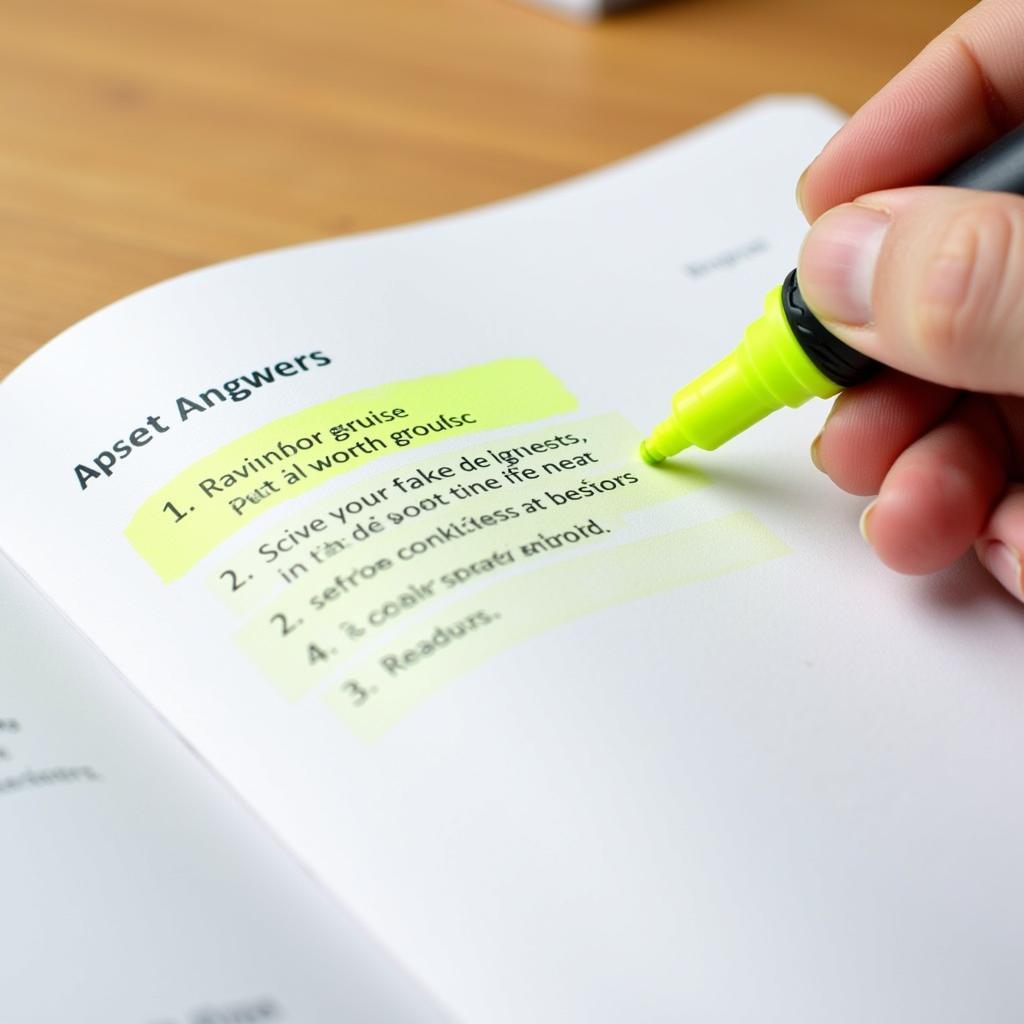Understanding the IELTS answer key is crucial for achieving a high band score on your IELTS exam. However, it’s not just about checking your answers; it’s about learning from them. To do this effectively, you need to be familiar with certain “essential words” that frequently appear in the answer keys and indicate the type of response expected. This article will delve into these essential words, equipping you with the knowledge to decipher the answer key and boost your IELTS performance.
Decoding the IELTS Answer Key: Why Essential Words Matter
The IELTS answer key provides more than just right or wrong answers; it offers insights into the examiner’s expectations. Essential words hold the key to understanding these expectations. They act as signposts, guiding you towards the specific information or language structures required for a high score.
Common Essential Words and Their Implications:
- Nouns: Identifying keywords that pinpoint the required information (e.g., “author’s opinion,” “main reason,” “specific example”).
- Verbs: Understanding the action words that define the task (e.g., “describe,” “explain,” “compare,” “contrast”).
- Adverbs: Paying attention to words that qualify the answer (e.g., “mainly,” “primarily,” “significantly”).
- Connectors: Recognizing words that show the relationship between ideas (e.g., “however,” “therefore,” “in addition”).
 Analyzing IELTS Answer Keys
Analyzing IELTS Answer Keys
Practical Examples: Essential Words in Action
Let’s examine how essential words function within different IELTS sections:
Listening: In a multiple-choice question, the essential word “NOT” completely changes the task. Instead of identifying the correct answer, you need to find the option that is incorrect or not mentioned.
Reading: When a question asks for the “main idea” of a paragraph, you must identify the most important point, not just any supporting detail.
Writing Task 1: If the instructions say “summarise,” you need to provide a concise overview, avoiding unnecessary details or personal opinions.
Writing Task 2: Understanding the difference between “discuss both views” and “give your own opinion” is crucial for addressing the prompt correctly.
 Preparing for the IELTS Exam
Preparing for the IELTS Exam
Strategies for Mastering Essential Words:
- Active Reading: Pay close attention to keywords in questions and instructions.
- Vocabulary Building: Expand your vocabulary, focusing on synonyms, antonyms, and related words.
- Practice Tests: Regularly review answer keys, paying attention to how essential words shape the expected responses.
Conclusion: Essential Words, Essential Skills
Mastering essential words is not just about memorization; it’s about developing a deeper understanding of the IELTS exam format and assessment criteria. By incorporating these words into your study strategy, you can unlock the secrets of the answer key, refine your responses, and ultimately achieve your desired IELTS band score.
FAQs
-
Are essential words the same across all IELTS test versions?
While the specific words may vary slightly, the underlying concepts and functions remain consistent across different test versions. -
How can I improve my vocabulary for identifying essential words?
Reading widely, using flashcards, and practicing with past papers can significantly enhance your vocabulary and ability to recognize essential words. -
Do essential words only matter for the reading and listening sections?
No, they are equally important for the writing and speaking sections. Understanding the keywords in the prompts and tasks is essential for providing accurate and relevant responses.
Need More Help with Your IELTS Preparation?
For personalized guidance and expert tips on acing the IELTS exam, explore our other resources:
- IELTS Listening Practice Test 15
- IELTS Listening Four Business Values
- IELTS Free Test Reading
- IELTS Listening and Reading Answer Sheet
- IELTS Listening Recent Actual Test Vol 5
Contact us at 0372960696 or email tuyet.sixt@gmail.com. We are available 24/7 to assist you. Visit us at 260 Cầu Giấy, Hà Nội for in-person consultations. Our team is dedicated to supporting your IELTS journey and helping you achieve your academic and professional goals.




